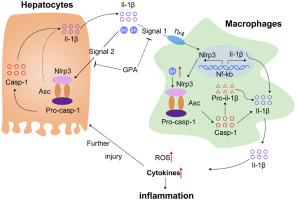Redox Biology ( IF 11.4 ) Pub Date : 2022-07-14 , DOI: 10.1016/j.redox.2022.102404 Meng Song 1 , Zijun Chen 2 , Ruian Qiu 2 , Tingwei Zhi 2 , Wenmin Xie 2 , Yingya Zhou 2 , Nachuan Luo 3 , Fuqian Chen 2 , Fang Liu 2 , Chuangpeng Shen 4 , Sheng Lin 5 , Fengxue Zhang 6 , Yong Gao 7 , Changhui Liu 2

|
The excessive accumulation of bile acids (BA) in hepatocytes can trigger inflammatory response and recruit macrophages, thereby accelerating cholestatic liver injury. The crosstalk between hepatocytes and macrophages has been recently implicated in the pathogenesis of cholestasis; however, the underlying mechanisms remain unclear. Here, we demonstrated that BA initiate NLRP3 inflammasome activation in hepatocytes to release proinflammatory cytokines and promote the communication between hepatocytes and macrophages, thus enhancing liver inflammation in an NLRP3-dependent manner. NLRP3-inhibition by geniposidic acid (GPA), a novel NLRP3-specific covalent inhibitor that directly interacts with NLRP3, in hepatocytes and macrophages abated BA-induced inflammation. Moreover, NLRP3-deletion or its inhibition mitigated ANIT-induced cholestatic inflammation, whereas disrupting the crosstalk between hepatic macrophages and hepatocytes attenuated the hepatoprotective effect of GPA against ANIT-induced cholestatic inflammation. Therefore, blocking this crosstalk by suppressing NLRP3 inflammasome activation may represent a novel therapeutic strategy for cholestasis.
中文翻译:

京尼平苷酸抑制 NLRP3 介导的肝细胞和肝巨噬细胞之间的串扰可减轻胆汁淤积性肝脏炎症损伤
肝细胞中胆汁酸(BA)的过度积累会引发炎症反应并招募巨噬细胞,从而加速胆汁淤积性肝损伤。最近,肝细胞和巨噬细胞之间的相互作用被认为与胆汁淤积的发病机制有关。然而,其根本机制仍不清楚。在这里,我们证明 BA 启动肝细胞中的 NLRP3 炎症小体激活,释放促炎细胞因子并促进肝细胞和巨噬细胞之间的通讯,从而以 NLRP3 依赖性方式增强肝脏炎症。京尼平苷酸 (GPA) 是一种新型 NLRP3 特异性共价抑制剂,可直接与肝细胞和巨噬细胞中的 NLRP3 相互作用,对 NLRP3 的抑制可减轻 BA 诱导的炎症。此外,NLRP3缺失或其抑制可减轻ANIT诱导的胆汁淤积性炎症,而破坏肝巨噬细胞和肝细胞之间的串扰则减弱GPA对ANIT诱导的胆汁淤积性炎症的保肝作用。因此,通过抑制 NLRP3 炎性体激活来阻断这种串扰可能代表了一种新的胆汁淤积治疗策略。



























 京公网安备 11010802027423号
京公网安备 11010802027423号